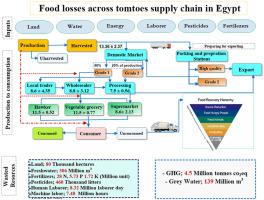Journal of Cleaner Production ( IF 9.7 ) Pub Date : 2021-09-27 , DOI: 10.1016/j.jclepro.2021.129146 Abdelrahman Ali 1, 2 , Chunping Xia 1 , N'Banan Ouattara 1, 3 , Irfan Mahmood 1, 4 , Muhammad Faisal 1

|
Reducing Food losses and waste (FLW) is a key global challenge to ensure sufficient food for the future and to use available natural resources more efficiently. This study based on the primary data collected from 343 tomato supply chain actors' in Egypt. We adopted the life cycle assessment approach and the category method (C-Method) to estimate the percentage of postharvest losses (PHL) and their economic and environmental impacts. The result revealed the average percentage of PHL is 13.36%, 7.5%, 8.6%, 8.8% and 11.63% for the farmers, processors, village traders', wholesalers and retailers respectively. The total land and water used to produce this lost food estimated around 80 thousand hectares and 306 million cubic meters, besides the other production inputs. Which cost the Egyptian economy about 449$ million annually and emits 4.5 million tons of CO2eq. The study highlights the importance of prevention strategies is better than recovering ones to mitigate the economic and environmental impacts of FLW. Additionally, diversity of the marketing channels for perishables could contribute to lessen the percentage of PHL through reducing unsold share, meet the consumers’ preferences and providing greater marketing opportunities for small farmers. This study suggests the intervention of mitigation PHL should include the different actors from the farmers to retailers. Adopting a short supply chain, collective marketing, access to cold transportation and storage services, that could maintain product quality and extending its shelf-life. Agricultural education is essential for disseminating the best agricultural practices including the postharvest operations for perishable products. Therefore, design sustainable intervention strategies require intensive public-private partnership and it should include incentives for small stakeholders. That could raise their knowledge, improve their skills and practices, and change their attitudes to be more sustainable users for the limited natural resources.











































 京公网安备 11010802027423号
京公网安备 11010802027423号